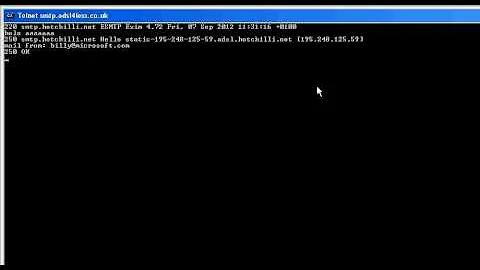How to find out what port is Exim 4 using for SMTP?
You may want to add a log line showing the port that is actually used during this very connection. Something like (not sure if you really need the condition)
warn condition = yes
log_message = Port: $received_port
in the beginning of your check_helo acl.
Related videos on Youtube
Faheem Mitha
Updated on September 18, 2022Comments
-
Faheem Mitha over 1 year
I'm trying to debug a problem with email sending on my home machine, possibly a router related problem. This is on Debian squeeze with Exim 4.72-6+squeeze3 (the default Exim 4 Debian package for this release).
I'm getting a
Relaying denied. Proper authentication requirederror.A reasonable first step is to determine what port my Exim 4 client is currently attempting to use. However, this seems to be surprisingly difficult to find out.
The Debian documentation tells me that the Debian Exim tries to use TLS if available, but I don't know how to confirm that either. Here is an example from my Exim client log (
/var/log/exim4/mainlog), when mail sending was still working.2013-04-28 15:04:30 1UWNzx-00084Y-EO => [email protected] R=smarthost T=remote_smtp_smarthost H=email32.luxsci.com [ 64.39.7.160] X=TLS1.0:RSA_AES_256_CBC_SHA1:32 DN="serialNumber=OeuJg-G-8alU-6KqWL5z-WwlWFVKQgwj,C=US,ST=Massachusetts,L=Dedham,O=Lux Scientiae,OU=Secure Services,CN=*.luxsci.com"Does the
TLS1mean TLS is being used, or is it just a meaningless string? Assuming it is using TLS, then that suggests that port 465 is used, since that is apparently the default. But how can I confirm any of this?Here is a version of the currently failing mail sending.
2013-05-05 22:11:28 1UZ0OM-0003SM-6Z ** [email protected] R=smarthost T=remote_smtp_smarthost: SMTP error from remote mail server after RCPT TO:<[email protected] >: host secure-email-32.luxsci.com [64.39.7.160]: 550 5.7.1 <[email protected]>... Relaying denied. Proper authentication required.-
dawud about 11 yearsThe proper thing to do is test the routing with
exim -bt user@domainfirst. To check what port is being usedlsof -i -P | grep exim -
Faheem Mitha about 11 yearsFor the former, I get
exim -bt user@domain R: smarthost for user@domain user@domain router = smarthost, transport = remote_smtp_smarthost host email32.luxsci.com [64.39.7.160]For the latter, I getlsof -i -P | grep exim exim4 25829 Debian-exim 3u IPv4 784099 0t0 TCP orwell:25 (LISTEN). Forgive my ignorance, but does that mean the connection is happening on port 25? I thought the port referred to that on the remote machine, though. -
dawud about 11 yearsIt is not clear from the info you provided in the question where are you trying to connect to, nor if the remote server uses authentication or TLS. The
user@domainpart wasn't meant to be written literally, rather replaced by the actual mail address you are supposed to be using. -
Faheem Mitha about 11 yearsI'm trying to pass my messages on to a smarthost, which does provide TLS. As far as the
exim -btcommand goes, I get the same result as already posted, with any email address I use. It appears emails are being both being accepted, and not being accepted, in a single queue run, so there may be something funky going on with the smarthost.
-
-
Faheem Mitha about 11 yearsIt seems that my setup is basically Ok, because the messages get accepted at least some of the time. However, the messages are also getting rejected some of the time, sometimes in the same delivery attempt. In any case, I'd like to know how to determine what port Exim is using to attempt to deliver these messages via SMTP.
-
 AnFi about 11 yearsThe host may accept its "local email domains" without authentication.
AnFi about 11 yearsThe host may accept its "local email domains" without authentication. -
Faheem Mitha about 11 yearsI've been testing using disposable email addresses, and these go through. These aren't local email domains by any definition.




